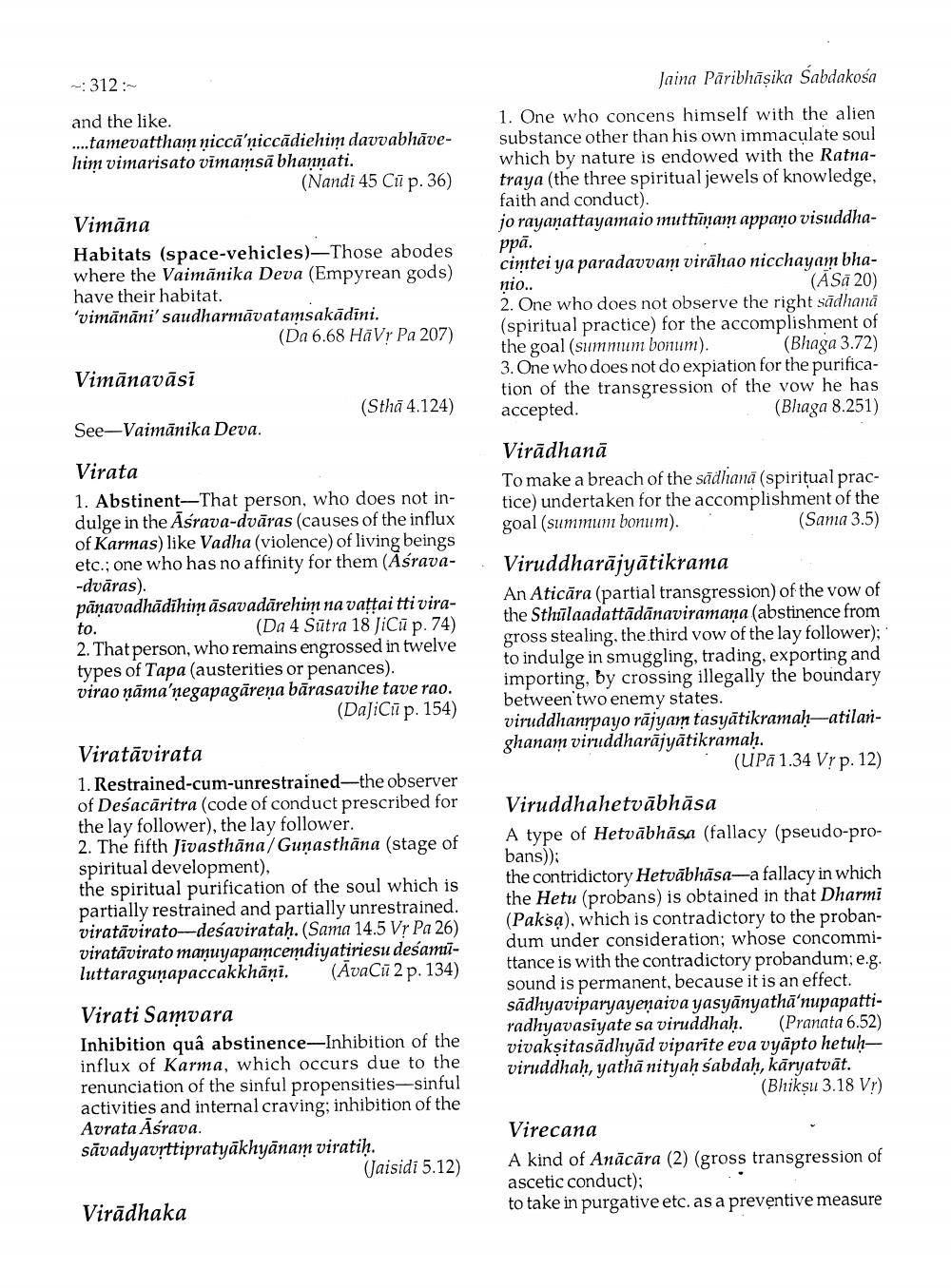________________
- 312 :
Jaina Pāribhāșika Sabdakosa
and the like. ....tamevattham niccā'nicсādiehim davvabhāvehim vimarisato vimamsā bhannati.
(Nandi 45 Cū p. 36)
Vimāna Habitats (space-vehicles)—Those abodes where the Vaimānika Deva (Empyrean gods) have their habitat. 'vimānāni' saudharmāvatamsakādini.
(Da 6.68 HäVr Pa 207)
1. One who concens himself with the alien substance other than his own immaculate soul which by nature is endowed with the Ratnatraya (the three spiritual jewels of knowledge, faith and conduct). jo rayanattayamaio muttūnam appano visuddhappā. cimtei ya paradavvam virāhao nicchayam bha
(ASā 20) 2. One who does not observe the right sādhanā (spiritual practice) for the accomplishment of the goal (summum bonum). (Bhaga 3.72) 3. One who does not do expiation for the purification of the transgression of the vow he has accepted.
(Bhaga 8.251)
nio..
Vimānavāsi
(Sthā 4.124)
See-Vaimānika Deva.
Virādhanā To make a breach of the sādhana (spiritual practice) undertaken for the accomplishment of the goal (summum bonum).
(Sama 3.5)
Virata 1. Abstinent-That person, who does not indulge in the Aśrava-dvāras (causes of the influx of Karmas) like Vadha (violence) of living beings etc.; one who has no affinity for them (Aśrava- -dvāras) pānavadhādihim āsavadārehim na vattai tti virato.
(Da 4 Sūtra 18 JiCū p. 74) 2. That person, who remains engrossed in twelve types of Tapa (austerities or penances). virao ņāma'negapagāreņa bārasavihe tave rao.
(Dalicū p. 154)
Viruddharājyātikrama An Aticāra (partial transgression) of the vow of the Sthūlaadattādānaviramana (abstinence from gross stealing, the third vow of the lay follower); to indulge in smuggling, trading, exporting and importing, by crossing illegally the boundary between two enemy states. viruddhanrpayo rājyam tasyātikramah-atilarghanam viruddharājyātikramaḥ.
(UPā 1.34 Vrp. 12)
Viratāvirata 1. Restrained-cum-unrestrained-the observer of Deśacāritra (code of conduct prescribed for the lay follower), the lay follower. 2. The fifth Jivasthāna/Gunasthāna (stage of spiritual development), the spiritual purification of the soul which is partially restrained and partially unrestrained. viratāvirato-desavirataḥ. (Sama 14.5 Vr Pa 26) viratāvirato manuyapamcemdiyatiriesu desamüluttaraguņapaccakkhāņi. (ĀvaCū 2 p. 134)
Viruddhahetvābhāsa A type of Hetvābhāsa (fallacy (pseudo-probans)); the contridictory Hetvābhāsa-a fallacy in which the Hetu (probans) is obtained in that Dharmi (Paksa), which is contradictory to the probandum under consideration; whose concommittance is with the contradictory probandum; e.g. sound is permanent, because it is an effect. sādhyaviparyayeņaiva yasyānyathā'nupapattiradhyavasiyate sa viruddhaḥ (Pranata 6.52) vivaksitasādliyād viparite eva vyāpto hetuhviruddhah, yathā nityaḥ sabdah, kāryatvāt.
(Bhiksu 3.18 Vr)
Virati Samvara Inhibition quâ abstinence-Inhibition of the influx of Karma, which occurs due to the renunciation of the sinful propensities-sinful activities and internal craving; inhibition of the Avrata Aśrava. sāvadyavrttipratyākhyānam viratiḥ.
(Jaisidi 5.12)
Virecana A kind of Anācāra (2) (gross transgression of ascetic conduct); to take in purgative etc. as a preventive measure
Virādhaka




